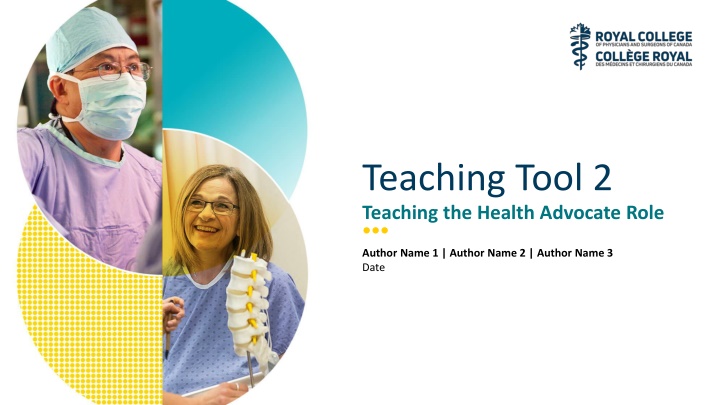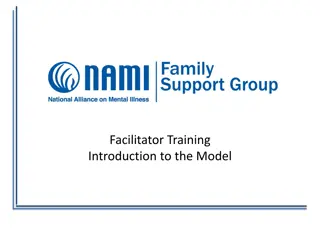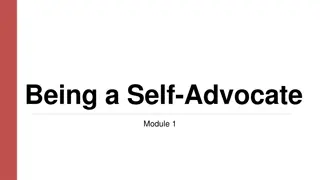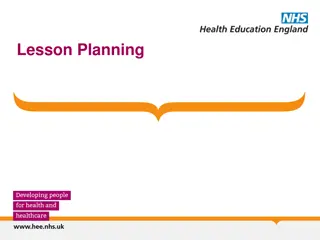
Teaching the Health Advocate Role: Objectives, Importance & Details
Learn about the vital role of health advocacy, key objectives, and why it matters in providing effective medical care. Understand the determinants of health and essential advocacy processes.
Download Presentation

Please find below an Image/Link to download the presentation.
The content on the website is provided AS IS for your information and personal use only. It may not be sold, licensed, or shared on other websites without obtaining consent from the author. If you encounter any issues during the download, it is possible that the publisher has removed the file from their server.
You are allowed to download the files provided on this website for personal or commercial use, subject to the condition that they are used lawfully. All files are the property of their respective owners.
The content on the website is provided AS IS for your information and personal use only. It may not be sold, licensed, or shared on other websites without obtaining consent from the author.
E N D
Presentation Transcript
Teaching Tool 2 Teaching the Health Advocate Role Author Name 1 | Author Name 2 | Author Name 3 Date
The unmodified content below was created for the CanMEDS Teaching and Assessment Tools Guide by S Glover Takahashi and is owned by the Royal College of Physicians and Surgeons of Canada. You may use, reproduce and modify the content for your own non-commercial purposes provided that your modifications are clearly indicated and you provide attribution to the Royal College. The Royal College may revoke this permission at any time by providing written notice. NOTICE: The content below may have been modified from its original form and may not represent the opinion or views of the Royal College. 2 T2 - Teaching the Health Advocate Role
Objectives and Agenda 1. Recognize common words related to the process and content of health advocacy. 2. Apply key health advocacy steps to examples from day-to-day practice. 3. Develop a personal health advocacy resource for common patient needs. 3 T2 - Teaching the Health Advocate Role
Why the Health Advocate Role matters 1. Advocacy happens all the time. 2. Health advocacy is a team sport 3. Effective medical care requires disease prevention, health promotion, health protections and promotion of health equity. 4 T2 - Teaching the Health Advocate Role
The details: What is the Health Advocate Role As Health Advocates, physicians contribute their expertise and influence as they work with communities or patient populations to improve health. They work with those they serve to determine and understand needs, speak on behalf of others when required, and support the mobilization of resources to effect change. 5 T2 - Teaching the Health Advocate Role
Determinants of health Determinants of health are the social and physical factors that impact the health outcomes of people and populations. Learners who understand the determinants of health understand that the health of individuals is closely related to the broader community and environmental context in which they live. 6 T2 - Teaching the Health Advocate Role
Recognizing Health Advocate process Advise Justify Assist Empower Encourage Liaise Navigate Negotiate Facilitate Influence Recommend Support 7 T2 - Teaching the Health Advocate Role
Recognizing Health Advocate content Access Policy Barriers Competing needs Health behaviours Poverty Prevention Risk factor modification Health promotion Health literacy Literacy Safety Social environment Surveillance 8 T2 - Teaching the Health Advocate Role
What is Health Advocacy Advocacy is not an action of an individual physician; rather, it is a shared process done in collaboration with the patient and with other health care providers or individuals. Many clinicians will identify with advocacy as agency, which entails working within the system day to day to meet the health needs of a specific patient or community An explicit discussion using discipline- specific examples will help learners navigate the overlap in interests between the competencies of the Health Advocate Role and the stewardship competencies of the Leader Role. 9 T2 - Teaching the Health Advocate Role
Guided reflection and discussion Teaching Tool 3 10 T2 - Teaching the Health Advocate Role
Key process steps in health advocacy 1. Establish an understanding of the patient s preferences, needs, strengths, and values for health care. 2. Collaborate with the patient, other health care professionals, and/or health promotion organizations. 3. Develop the action plan with the patient, other health are professionals, and/or health promotion organizations to help the patient achieve their self- identified goals. 4. Implement the agreed-to plan (i.e. by supporting, following, or on occasion leading, as appropriate). 5. Maintain open communication with the patient, other health care professionals, and/or health promotion organizations. 11 T2 - Teaching the Health Advocate Role
Putting health advocacy into action 1. Advocacy for services or resources. 2. Advocacy for healthy behaviours. 3. Advocacy for prevention, promotion, surveillance. 12 T2 - Teaching the Health Advocate Role
Small Group Activity 13 T2 - Teaching the Health Advocate Role
Health Advocacy in day-to-day practice 14 T2 - Teaching the Health Advocate Role
Guided reflection and discussion 15 T2 - Teaching the Health Advocate Role
Tips for teaching health advocacy 1. Provide resources about health advocacy needs of the communities and populations you serve. 2. Start a conversation about health advocacy. 3. Model health advocacy. 4. Signpost when you start to act as an advocate. 5. Help learners recognize advocacy needs 6. Create opportunities for learners to act as advocates. 16 T2 - Teaching the Health Advocate Role
Tips for assessing health advocacy 1. Assess in a clinical setting with the help of other health professionals. 2. Include health advocacy in case presentations, case reports and rounds. 3. Assess how your learners are balancing the needs for health advocacy 17 T2 - Teaching the Health Advocate Role
Objectives and Agenda 1. Recognize common words related to the process and content of health advocacy. 2. Apply key health advocacy steps to examples from day-to-day practice. 3. Develop a personal health advocacy resource for common patient needs. 18 T2 - Teaching the Health Advocate Role
References Sherbino J, Bonnycastle D, C t B, Flynn L, Hunter A, Ince-Cushman D, Konkin J, Oandasan I, Regehr G, Richardson D, Zigby J. Health Advocate. In: Frank JR, Snell L, Sherbino J, editors. CanMEDS 2015 Physician Competency Framework. Ottawa: Royal College of Physicians and Surgeons of Canada; 2015. 19 T2 - Teaching the Health Advocate Role
Other Slides 20 T2 - Teaching the Health Advocate Role
Health Advocate Key Competencies Physicians are able to: 1. Respond to an individual patient s health needs by advocating with the patient within and beyond the clinical environment. 2. Respond to the needs of the communities or populations they serve by advocating with them for system-level change in a socially accountable manner. 21 T2 - Teaching the Health Advocate Role
Health Advocate Key Competency 1 Physicians are able to: 1. Respond to an individual patient s health needs by advocating with the patient within and beyond the clinical environment. 1.1 Work with patients to address determinants of health that affect them and their access to needed health services or resources. 1.2 Work with patients and their families to increase opportunities to adopt healthy behaviours. 1.3 Incorporate disease prevention, health promotion, and health surveillance into interactions with individual patients. 22 T2 - Teaching the Health Advocate Role
Health Advocate Key Competency 2 Physicians are able to: 1. Respond to the needs of the communities or populations they serve by advocating with them for system-level change in a socially accountable manner. 1.1 Work with a community or population to identify the determinants of health that affect them. 1.2 Improve clinical practice by applying a process of continuous quality improvement to disease prevention, health promotion, and health surveillance activities. 1.3 Contribute to a process to improve health in the community or population they serve. 23 T2 - Teaching the Health Advocate Role
Thank You royalcollege.ca collegeroyal.ca Presented by: John Smith | jsmith@royalcollege.ca | 613-730-8177






















